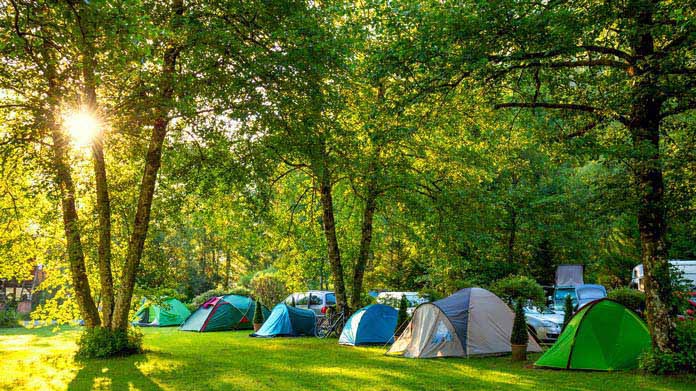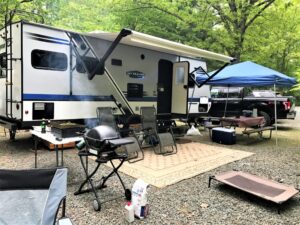Yes, you can set up a campsite on your land. This is possible if you comply with local regulations and obtain necessary permits.
Setting up your campsite provides an opportunity for outdoor enthusiasts to enjoy the natural surroundings and create memorable experiences. It can be an ideal option for those who own large tracts of land in rural areas or want to connect with nature on their property.
However, it is essential to research and understand any legal requirements and limitations before proceeding with the setup. Consulting with local authorities or land management agencies can help ensure that you follow all necessary guidelines and regulations.

Credit: howtostartanllc.com
Understanding The Regulations And Permits
Researching The Rules And Regulations
Before you set up a campsite on your land, it is essential to understand the rules and regulations surrounding this activity. This will ensure that you are compliant with the law and avoid any potential fines or legal issues. Here are some key points to consider when researching the rules and regulations for setting up a campsite on your land:
- Local zoning and land use laws: Every locality has its own zoning and land use laws that determine what types of activities are allowed on a property. These laws specify the purpose for which an area can be utilized, such as residential, commercial, agricultural, or recreational. It is crucial to research the zoning ordinances in your area to determine whether camping is permitted on your land.
- Environmental regulations: Campsites can have an impact on the environment, so it is important to be aware of any environmental regulations that may apply to your property. These regulations may include restrictions on waste management, water usage, and protection of natural resources. Understanding and adhering to these regulations will help you minimize your ecological footprint and preserve the environment.
- Safety codes and fire regulations: Safety is paramount when operating a campsite. It is advisable to familiarize yourself with safety codes and fire regulations that apply to camping activities. This includes guidelines for fire pits, emergency exits, access to medical facilities, and proper sanitation facilities. Compliance with these regulations will ensure the safety of your campers and help prevent accidents or emergencies.
Obtaining The Necessary Permits And Approvals
Once you have researched the rules and regulations governing campsites on private land, you may discover that obtaining permits and approvals is a requirement. Here are a few key points to consider when it comes to obtaining the necessary permits and approvals for setting up a campsite on your land:
- Local government approval: Depending on your location, you may need to obtain approval from the local government or planning department. This may involve submitting a detailed plan of your proposed campsite, documenting its compliance with zoning laws and safety regulations. Contact your local government office to inquire about the necessary permits and approvals required in your area.
- Health and safety inspections: Health and safety inspections may be required to ensure that your campsite meets certain standards. These inspections may assess aspects such as sanitation facilities, waste management, and emergency preparedness. By passing these inspections and obtaining the necessary certifications, you can demonstrate your commitment to providing a safe and hygienic camping experience.
- Insurance coverage: It is crucial to review your insurance coverage to ensure that you are adequately protected when operating a campsite. Consult with your insurance provider to understand any additional policies or coverage requirements that may be necessary. This will provide you with peace of mind in case of accidents, property damage, or liability claims.
Remember, regulations and permit requirements may vary depending on your location, so it is important to do thorough research specific to your area. Seeking legal advice or consulting with local authorities can provide you with the most accurate and up-to-date information regarding the regulations and permits for setting up a campsite on your land.
Assessing Your Land For Campsite Suitability
Evaluating The Topography And Terrain
When considering setting up a campsite on your land, it is crucial to assess the topography and terrain to ensure the safety and comfort of campers. Here are some key points to consider:
- Elevation: Determine the overall elevation of your land, as it can impact temperature, weather conditions, and the availability of panoramic views.
- Slope and grade: Assess the slope and grade of the land to identify any potential hazards such as uneven ground or water runoff. A relatively flat area is typically preferred for pitching tents and setting up camping facilities.
- Natural features: Take note of any natural features on your land, such as trees, rocks, or water bodies. These features can add beauty and generate interest for campers.
Considering Environmental Impact And Conservation
Creating a campsite comes with a responsibility to protect the environment and preserve the natural beauty of your land. Here are some aspects to consider:
- Ecological impact: Evaluate the potential impact on flora and fauna. Avoid setting up campsites in protected areas or fragile ecosystems to prevent disturbance or damage.
- Waste management: Establish effective waste management practices to ensure campers can dispose of their garbage responsibly. Consider setting up recycling stations and providing clear instructions on waste disposal.
- Preservation efforts: Encourage campers to respect and appreciate the surrounding environment. Educate them about local conservation efforts and share guidelines for minimizing their ecological footprint.
Availability And Access To Basic Amenities
Providing basic amenities can enhance the camping experience and attract more campers to your site. Take note of the following:
- Water: Assess the availability of water sources on your land, such as natural springs, rivers, or wells. Consider providing access to clean water for cooking, drinking, and hygiene purposes.
- Toilets and showers: Determine whether you can provide portable toilets or construct permanent restroom facilities. Access to showers and sanitation facilities is crucial for camper convenience.
- Electricity: Evaluate the possibility of supplying electricity to the campsite. This can be through the installation of electrical hookups or the provision of alternative power sources like solar panels.
Remember, thorough evaluation of your land for campsite suitability ensures the safety, enjoyment, and satisfaction of campers while preserving the natural environment. Use the above considerations as a guide to make informed decisions when setting up your campsite. Happy camping!
Creating A Safe And Enjoyable Campsite
Are you wondering if you can set up a campsite on your land? The good news is that, in many cases, the answer is yes! Setting up a campsite on your land can be a fun and rewarding experience, whether you’re looking to host friends and family or start your own camping business.
However, it’s important to ensure that your campsite is safe and enjoyable for everyone involved. In this section, we’ll explore some key considerations for creating a safe and enjoyable campsite experience.
Clearing And Preparing The Campsite Area
Before you can start setting up your campsite, it’s essential to clear and prepare the campsite area properly. Here are some key points to keep in mind:
- Evaluate the space: Take a walk around your land and identify the most suitable area for your campsite. Consider factors such as accessibility, availability of water sources, terrain, and natural surroundings.
- Remove hazards: Clear the campsite area of any potential hazards such as rocks, branches, or uneven ground. This will help prevent accidents and injuries.
- Level the ground: Ensure that the ground is level and free from any large bumps or depressions. This will make setting up tents and other equipment much easier and more comfortable for campers.
- Provide ample space: Make sure your campsite offers enough space for tents, campfires, and communal areas. Campers should have room to move around and enjoy various activities without feeling cramped.
Setting Up Campsite Infrastructure And Facilities
To create a comfortable and enjoyable campsite, it’s important to consider the infrastructure and facilities that you’ll provide. Here are some key points to consider:
- Basic amenities: Provide essential amenities such as toilets, showers, and washing stations. These facilities are crucial for maintaining hygiene and ensuring a pleasant camping experience.
- Campfire areas: Designate safe and designated campfire areas with proper fire pits. Ensure clear boundaries to prevent fires from spreading and provide campers with a safe space to enjoy the warmth and ambiance of a campfire.
- Waste management: Implement a waste management system to keep the campsite clean and eco-friendly. Set up designated trash and recycling bins and encourage campers to dispose of waste responsibly.
- Water sources: Identify nearby water sources, such as rivers or wells, and ensure easy access for campers. Provide clean drinking water or establish a method for water purification.
Safeguarding Campers And Ensuring Fire Safety
The safety of campers should be your top priority when setting up a campsite. Here are some key points to consider:
- Ensure clear pathways: Clear and mark pathways within the campsite to guide campers safely around the area, especially at night. Use glow sticks or solar-powered lights to make pathways visible.
- First aid kits: Keep well-stocked first aid kits readily available in case of any minor injuries or emergencies. Ensure that campers know the location of these kits and how to use them.
- Fire safety measures: Establish strict fire safety regulations to prevent accidents and manage potential fire hazards. Place fire extinguishers at strategic locations throughout the campsite and educate campers on fire safety best practices.
- Emergency contacts: Provide a list of emergency contacts, including local authorities and medical facilities, prominently displayed in the campsite. This information will be essential in case of any emergencies or accidents.
By taking these steps to create a safe and enjoyable campsite, you can ensure that your land becomes a haven for campers to relax, unwind, and connect with nature. Keep in mind that each campsite is unique, so tailor these considerations to fit your specific location and audience.
Happy camping!
Frequently Asked Questions On Can I Set Up A Campsite On My Land?
Can I Set Up A Campsite On My Land?
Yes, you can set up a campsite on your land as long as you comply with local zoning regulations and obtain the necessary permits and licenses.
What Are The Benefits Of Setting Up A Campsite On My Land?
Setting up a campsite on your land can provide additional income through camping fees, promote outdoor recreation, attract tourists, and utilize your unused space effectively.
What Amenities Should I Consider For My Campsite?
To make your campsite attractive, consider providing amenities such as clean water supply, restroom facilities, picnic tables, fire pits, trash bins, and designated camping spots.
Are There Any Legal Considerations I Need To Be Aware Of?
Yes, it is important to familiarize yourself with local laws regarding camping regulations, noise ordinances, waste disposal, and fire safety to ensure you operate your campsite legally and responsibly.
Conclusion
To sum up, setting up a campsite on your own land can be a convenient solution for outdoor enthusiasts. By understanding local regulations, preparing necessary permits, and complying with environmental considerations, you can enjoy the beauty of nature right in your own backyard.
Remember to consider the size and location of your land, as well as the potential impact on the surrounding environment. It’s important to ensure the safety and comfort of campers, providing necessary amenities such as water supply, waste disposal, and fire safety measures.
With careful planning and adherence to regulations, your land can transform into a retreat for camping enthusiasts, creating lasting memories and a closer connection to nature. So, if you’re lucky enough to have a piece of land to call your own, why not consider setting up a campsite and sharing your beautiful surroundings with fellow nature lovers?


